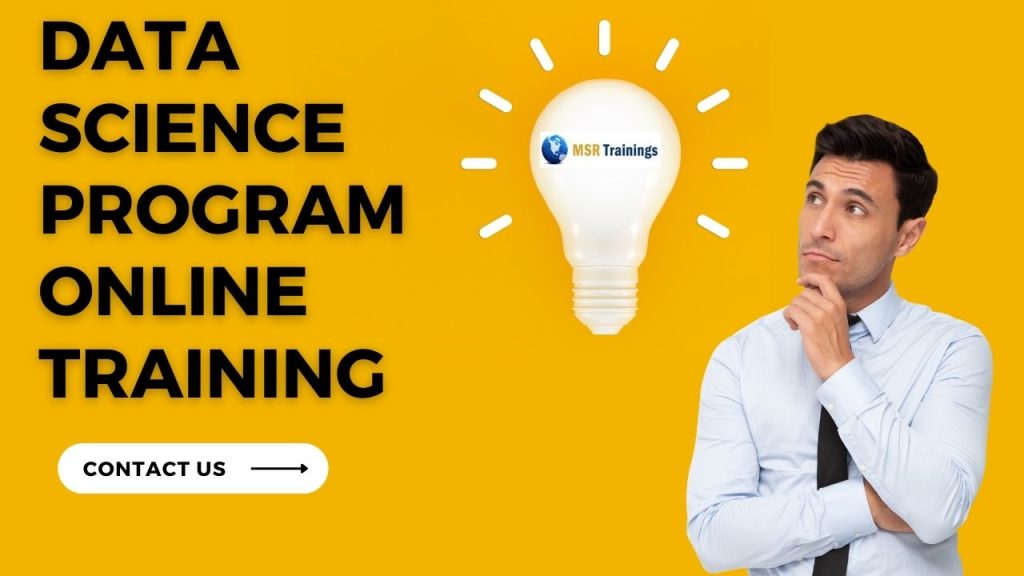Data Science Program course content
MSR Trainings offers the best Data Science certification online training, Learn Data Science Online Training Institute in Hyderabad from the Experts at MSR Trainings,
MSR Trainings is one of the best places for getting corporate, in-person, and online training for the Data Science Program. Our online data science training program is available to everyone in the world. The Best Datascience Training Center is MSR Trainings. We’ll assist with certification, resume writing, and interview preparation after the course end.

- Descriptive Statistics and Probability Distributions:
Introduction about Statistics
Different Types of Variables
Measures of Central Tendency with examples
Measures of Dispersion
Probability & Distributions
Probability Basics
Binomial Distribution and its properties
Poisson distribution and its properties
Normal distribution and its properties
2.Inferential Statistics and Testing of Hypothesis
Sampling methods
Different methods of estimation
Testing of Hypothesis & Tests
Analysis of Variance
3.Covariance & Correlation
Data Preparation
Exploratory Data analysis
Model Development
Model Validation
Model Implementation
4.Supervised Techniques:
Linear Regression – Introduction – Applications
Assumptions of Linear Regression
Building Linear Regression Model
Understanding standard metrics (Variable significance, R-square/Adjusted R-Square, Global hypothesis etc)
Validation of Linear Regression Models (Re running Vs. Scoring)
Standard Business Outputs (Decile Analysis, Error distribution (histogram), Model equation, drivers etc)
Interpretation of Results – Business Validation – Implementation on new data
Real time case study of Manufacturing and Telecom Industry to estimate the future revenue using the models
->> Logistic Regression – Introduction – Applications
Linear Regression Vs. Logistic Regression Vs. Generalized Linear Models
Building Logistic Regression Model
Understanding standard model metrics (Concordance, Variable significance, Hosmer Lemeshov Test, Gini, KS, Misclassification etc)
Validation of Logistic Regression Models (Re running Vs. Scoring)
Standard Business Outputs (Decile Analysis, ROC Curve)
Probability Cut-offs, Lift charts, Model equation, drivers etc)
Interpretation of Results – Business Validation – Implementation on new data
Real time case study to Predict the Churn customers in the Banking and Retail industry
->> Partial Least Square Regression
Partial Least square Regression – Introduction – Applications
Difference between Linear Regression and Partial Least Square Regression
Building PLS Model
Understanding standard metrics (Variable significance, R-square/Adjusted R-Square, Global hypothesis etc)
Interpretation of Results – Business Validation – Implementation on new data
Sharing the real time example to identify the key factors which are driving the Revenue
5.Variable Reduction Techniques
*Factor Analysis
*Principle component analysis
Assumptions of PCA
Working Mechanism of PCA
Types of Rotations
Standardization
Positives and Negatives of PCA
6.Supervised Techniques Classification:
->> CHAID
->> CART
->> Difference between CHAID and CART
->> Random Forest
Decision tree vs. Random Forest
Data Preparation
Missing data imputation
Outlier detection
Handling imbalance data
Random Record selection
Random Forest R parameters
Random Variable selection
Optimal number of variables selection
Calculating Out Of Bag (OOB) error rate
Calculating Out of Bag Predictions
->> Couple of Real time use cases which are related to Telecom and Retail Industry. Identification of the Churn.
7.Unsupervised Techniques:
->> Segmentation for Marketing Analysis
Need for segmentation
Criterion of segmentation
Types of distances
Clustering algorithms
Hierarchical clustering
K-means clustering
Deciding number of clusters
Case study
->> Business Rules Criteria
->> Real time use case to identify the Most Valuable revenue generating Customers.
8.Time series Analysis:
Time Series Components( Trend, Seasonality, Cyclicity and Level) and Decomposition
*Basic Techniques
Averages,
Smoothening etc
Advanced Techniques
AR Models,
ARIMA
UCM
*Hybrid Model
*Understanding Forecasting Accuracy – MAPE, MAD, MSE etc
*Couple of use cases, To forecast the future sales of products
9.Text Analytics
*Gathering text data from web and other sources
Processing raw web data
Collecting twitter data with Twitter API
*Naive Bayes Algorithm
Assumptions and of Naïve Bayes
Processing of Text data
Handling Standard and Text data
Building Naïve Bayes Model
Understanding standard model metrics
Validation of the Models (Re running Vs. Scoring)
*Sentiment analysis
Goal Setting
Text Preprocessing
Parsing the content
Text refinement
Analysis and Scoring
Learning Objectives
Course Features:
- Course Duration -30 Hours
- Levels-All Levels
- Language -English
- 1000+ Students
- Full lifetime access
- Job Assistance
- Mentor Support
- Guaranteed job support for freshers and professionals to start a great career in cloud technologies
- Get authorized and industry-recognized Devops certification after course completion
- A Portfolio of Real-world Projects
Choose The Best
Benefits of MSR Training Classes
100% Placement Support
Weekdays/Weekend LIVE classes
One-on-One with Mentors
Free Demo Classes
Industry Oriented Projects

Instructors are from MNC’s
Lab Sessions
Doubt Clearance Sessions
Designed by Industry experts
Recognized Certification
REQUEST A CALL BACK
Explore the trending and niche courses and learning maps. Learn about tuition fees, payment plans, and curriculum
